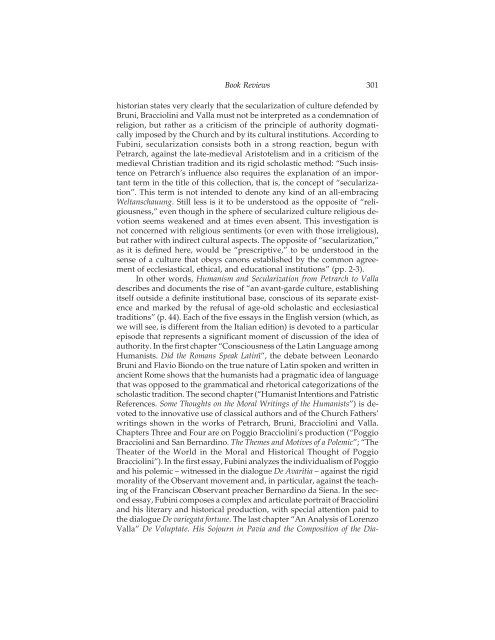Journal of Italian Translation
Journal of Italian Translation
Journal of Italian Translation
You also want an ePaper? Increase the reach of your titles
YUMPU automatically turns print PDFs into web optimized ePapers that Google loves.
Book Reviews 301<br />
historian states very clearly that the secularization <strong>of</strong> culture defended by<br />
Bruni, Bracciolini and Valla must not be interpreted as a condemnation <strong>of</strong><br />
religion, but rather as a criticism <strong>of</strong> the principle <strong>of</strong> authority dogmatically<br />
imposed by the Church and by its cultural institutions. According to<br />
Fubini, secularization consists both in a strong reaction, begun with<br />
Petrarch, against the late-medieval Aristotelism and in a criticism <strong>of</strong> the<br />
medieval Christian tradition and its rigid scholastic method: “Such insistence<br />
on Petrarch’s influence also requires the explanation <strong>of</strong> an important<br />
term in the title <strong>of</strong> this collection, that is, the concept <strong>of</strong> “secularization”.<br />
This term is not intended to denote any kind <strong>of</strong> an all-embracing<br />
Weltanschauung. Still less is it to be understood as the opposite <strong>of</strong> “religiousness,”<br />
even though in the sphere <strong>of</strong> secularized culture religious devotion<br />
seems weakened and at times even absent. This investigation is<br />
not concerned with religious sentiments (or even with those irreligious),<br />
but rather with indirect cultural aspects. The opposite <strong>of</strong> “secularization,”<br />
as it is defined here, would be “prescriptive,” to be understood in the<br />
sense <strong>of</strong> a culture that obeys canons established by the common agreement<br />
<strong>of</strong> ecclesiastical, ethical, and educational institutions” (pp. 2-3).<br />
In other words, Humanism and Secularization from Petrarch to Valla<br />
describes and documents the rise <strong>of</strong> “an avant-garde culture, establishing<br />
itself outside a definite institutional base, conscious <strong>of</strong> its separate existence<br />
and marked by the refusal <strong>of</strong> age-old scholastic and ecclesiastical<br />
traditions” (p. 44). Each <strong>of</strong> the five essays in the English version (which, as<br />
we will see, is different from the <strong>Italian</strong> edition) is devoted to a particular<br />
episode that represents a significant moment <strong>of</strong> discussion <strong>of</strong> the idea <strong>of</strong><br />
authority. In the first chapter “Consciousness <strong>of</strong> the Latin Language among<br />
Humanists. Did the Romans Speak Latinî”, the debate between Leonardo<br />
Bruni and Flavio Biondo on the true nature <strong>of</strong> Latin spoken and written in<br />
ancient Rome shows that the humanists had a pragmatic idea <strong>of</strong> language<br />
that was opposed to the grammatical and rhetorical categorizations <strong>of</strong> the<br />
scholastic tradition. The second chapter (“Humanist Intentions and Patristic<br />
References. Some Thoughts on the Moral Writings <strong>of</strong> the Humanists”) is devoted<br />
to the innovative use <strong>of</strong> classical authors and <strong>of</strong> the Church Fathers’<br />
writings shown in the works <strong>of</strong> Petrarch, Bruni, Bracciolini and Valla.<br />
Chapters Three and Four are on Poggio Bracciolini’s production (“Poggio<br />
Bracciolini and San Bernardino. The Themes and Motives <strong>of</strong> a Polemic”; “The<br />
Theater <strong>of</strong> the World in the Moral and Historical Thought <strong>of</strong> Poggio<br />
Bracciolini”). In the first essay, Fubini analyzes the individualism <strong>of</strong> Poggio<br />
and his polemic – witnessed in the dialogue De Avaritia – against the rigid<br />
morality <strong>of</strong> the Observant movement and, in particular, against the teaching<br />
<strong>of</strong> the Franciscan Observant preacher Bernardino da Siena. In the second<br />
essay, Fubini composes a complex and articulate portrait <strong>of</strong> Bracciolini<br />
and his literary and historical production, with special attention paid to<br />
the dialogue De variegata fortune. The last chapter “An Analysis <strong>of</strong> Lorenzo<br />
Valla” De Voluptate. His Sojourn in Pavia and the Composition <strong>of</strong> the Dia-
















